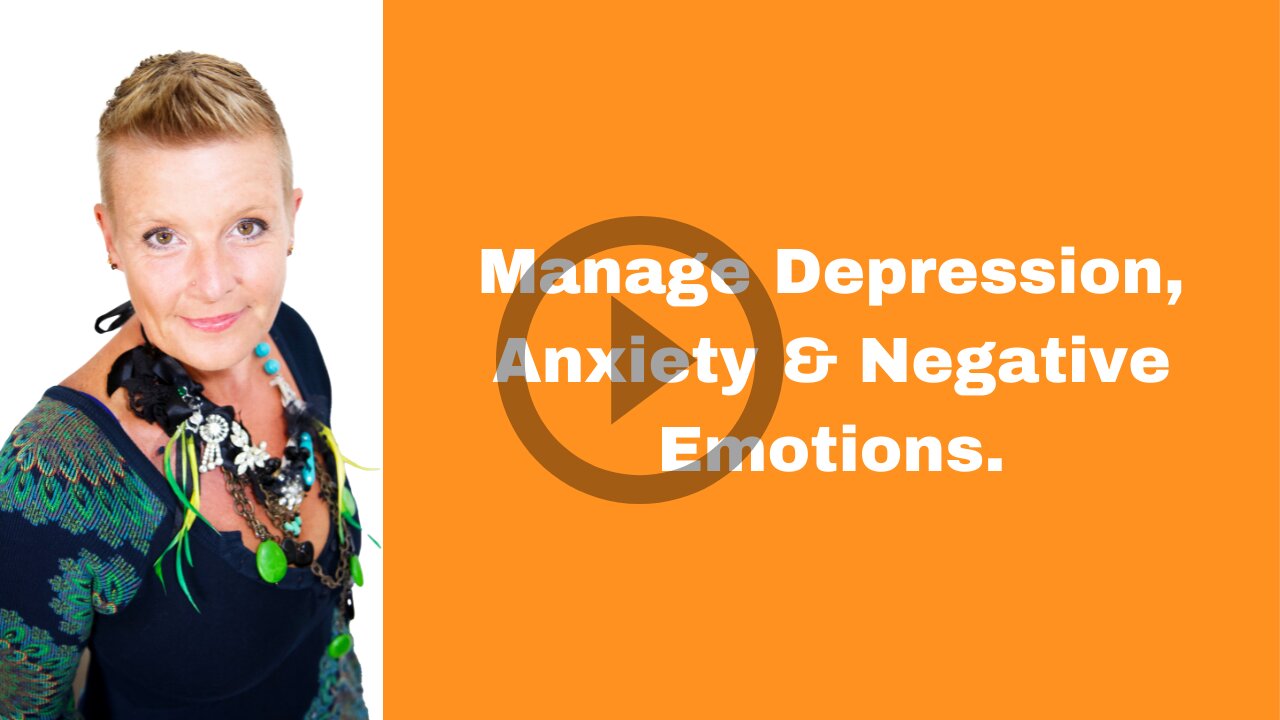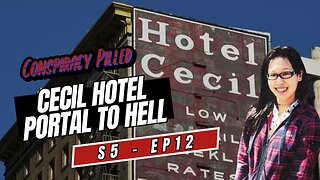Premium Only Content

Manage Depression, Anxiety & Negative Emotions
Do you want to learn how to manage depression, anxiety and negative emotions?
Your beliefs are made up of data or evidence you have taken on.
You can take on beliefs from your parents, peers, family, workmates, religion, and experiences you have had.
Not all of your beliefs are positive. So how do you change them?
You can do behavioral experiments that gather evidence to prove your belief is right.
This is how we believe what we believe now - we have enough evidence that we are correct. (Are we really though)?There are many ways of looking at the same thing.
Our thoughts tend to be mood congruent. In other words when we're sad, we have sad thoughts. When we're anxious, we have anxious thoughts. When we're angry, we have angry thoughts and so on.
When you're experiencing a strong negative emotion, by default your automatic thoughts are going to be negative in a way that reflects the emotion you are feeling.
It is not easy to believe or even remember the less negative thoughts that made sense when you weren't feeling that way.
Your Beliefs Are Resistant To Change!
If we've been thinking in a negative way for years changing these thoughts takes a while and new ways of thinking usually require some concrete evidence to back them up.
Some of this evidence can come from past experiences that you had where the negative thoughts you held to be true turned out not to be accurate.
You can also look for new evidence that supports your new belief.
For Example:
If there's something coming up that you're anxious about and you tell yourself it's not going to be as bad as you think, it can still be hard to believe.
But if what you were anxious about turns out to not be as bad as you'd feared, the next time you find yourself in a similar situation the thought might be, it won't be as bad.
It is going to be easier for you to believe because now you have some data and evidence from your real life to back it up.
Sometimes to change a thought, you need more evidence than this one experience, especially if you have believed this for years.
So you can set up behavioral experiments to gather more evidence that either supports or doesn't support your new less negative thoughts.
Let's look at some examples:
You can start by writing down your old habitual automatic negative thoughts.
Let's stick with the theme of anxiety.
You might have thoughts like: "I am going to get anxious if I do that. I can feel my breathing getting heavier, I am going to have a panic attack".
Now you need to create a behavioral experiment to test this hypothesis or new thought and if it's your first experiment testing out this new thought you want to pick something that's not going to cause you too much anxiety.
Something where the stakes are relatively low. That way you can feel comfortable enough to make sure you go through with it.
So maybe it is driving to a new place. Your thought could say, "I am going to get lost."
So you pick a place on the map, (take your map with you in case you need) and aim to get to the destination. Then you run the experiment. You get into your car, and arrive at your destination.
You drive straight to your destination.
Then note how much the outcome supports the thought you were testing.
In this case it supports it 100%.Then ask yourself what have I learned from this experiment?
You have learned that you can drive somewhere new without getting lost.
You have learned that you can drive somewhere new without getting anxious.
You have learned that doing something different made you proud (insert emotion) of yourself.
You can drive somewhere new without getting anxious and there is no negative consequence!
This is a simple example but that's what you're aiming for.
If the experiment would put you in a highly anxious state, the thought of doing that at this stage is probably going to make you too anxious and you may back out.
So once you have done this, experiment with something else. Something small.
Collect new data to back up your new thought.
The more you practice small things that make you a little anxious and prove your old thought a lie, the more you are building up new data that supports your new belief.
After you have enough data your new belief may be, "I can do this"!
Then you can find a situation where the stakes are a little higher.
To find out how to work one on one with Sharon click here: https://www.globalhealingexchange.com/mindset-mentoring-for-success/
To find one of Sharon's online programs click here: https://www.globalhealingexchange.com/store/
Learn more about holistic health and wellness at: https://www.globalhealingexchange.com
-
 LIVE
LIVE
Kimberly Guilfoyle
44 minutes agoFBI's Terror Response Failures, Live with Steve Friend & Kyle Seraphin | Ep. 185
1,806 watching -
 LIVE
LIVE
WeAreChange
1 hour agoMassive Developments In Vegas Investigation! UNREAL DETONATION, Shocking Details Emerge!
2,272 watching -
 DVR
DVR
In The Litter Box w/ Jewels & Catturd
20 hours agoAmerica Is Under Attack! | In the Litter Box w/ Jewels & Catturd – Ep. 711 – 1/02/2025
21.8K14 -
 1:45:25
1:45:25
The Quartering
3 hours agoHuge Update In Cybertruck Attack & Dark New Details From New Orleans Attacker & More!
61.8K34 -
 3:21:21
3:21:21
DemolitionDx
3 hours agochecking out multiple games
14.2K -
 2:14:38
2:14:38
Conspiracy Pilled
1 day agoPortal to Hell: The Elisa Lam/Cecil Hotel Case (S5 Ep 12)
10.5K2 -
 14:31
14:31
DeVory Darkins
1 day ago $5.66 earnedScott Jennings Drops Brutal TRUTH BOMB
14.1K119 -
 LIVE
LIVE
cbsking757
4 hours ago★TANKING RIVALS RANKED! GIFTED SUBS ARE LIVE! #marvel #marvelrivals
171 watching -
 4:04:55
4:04:55
Tate Speech by Andrew Tate
12 hours agoEMERGENCY MEETING EPISODE 99 - 2024 - TIME VACUUM
189K105 -
 26:14
26:14
Breaking Points
4 hours agoSH*TSHOW: FBI Retracts False Info on NOLA Attacker
39.8K29